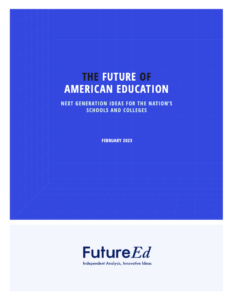 FutureEd Director Thomas Toch wrote this commentary as an introduction to a series of essays outlining a new, post-pandemic equity agenda for the nation’s schools and colleges.
FutureEd Director Thomas Toch wrote this commentary as an introduction to a series of essays outlining a new, post-pandemic equity agenda for the nation’s schools and colleges.
It is a fraught time in American education. A deadly global pandemic has left schools and colleges struggling with diminished student achievement and the substantial mental health consequences of the isolation and trauma that many students experienced. And it would be more than naïve to believe that the spasm of racial violence that swept the nation in recent years, the armed insurrection against the nation’s democratic institutions in the name of a failed presidential candidate, and the fighting of cultural battles in classrooms hasn’t made the day-to-day work of teaching and learning far harder.
What had been a bipartisan national commitment to teaching all students to higher standards in the name of educational equity and to the major routes to achieving that goal largely collapsed even before the onset of the pandemic.
Now, educational policies and priorities pushed by those at the extremes in the national education debate are ascendent. Conservatives and their red-state allies are seizing on public discontent with the educational disruptions of the pandemic to surge laws that allow parents to pay private school tuition with public monies. Supporters long touted vouchers, tuition tax credits and educational savings accounts as engines of educational equity, paths to better educational opportunities for low-income students.
Now, they invoke parental rights, even as the new laws provide few measures to help parents and taxpayers discern the quality of private schools. Teacher unions and others on the left, meanwhile, lament the public enabling of private education even as they attack school reform and offer scant strategies of their own to improve public education, absent more money for schools. Conversations about academic achievement are drowned out in this environment, even though parents tell pollsters they’re more concerned about school quality than culture battles.
The pandemic taught some valuable lessons, including the importance of school as a place (even as some school districts and education entrepreneurs used technology creatively to get outstanding teachers in front of more students) and the reality that educators ignore the social and emotional side of learning at their peril.
And some beacons of bipartisan reform shone through the fog hanging over the education landscape: the spread of research-based reading methods; a widening commitment to high-quality tutoring systems; new, career-oriented high school pathways; and a willingness to pay teachers for expertise in the face of severe shortages. These are scalable strategies that could help strengthen the nation’s education enterprise.
But the core work that leaders from every sector of public life and across the political spectrum gave public schools and colleges in recent decades—promoting greater educational equity and social mobility by teaching more students to high standards, especially the most vulnerable, most-often marginalized students—is far from completed. The moral and economic imperative to improve the quality of public education needs to remain a national North Star.
It became clear as the work to strengthen the nation’s schools in recent decades evolved that high standards, steps to strengthen teaching and teaching profession, and meaningful measures of and incentives to improve institutions’ performance were necessary ingredients of that work, even if they eventually came under fire from both ends of the political spectrum. But they weren’t sufficient to turn schools and colleges into the robust engines of educational equity and social mobility we need them to be.
In the wake of the pandemic and the other upheavals, FutureEd asked a number of leading education thinkers, activists, and entrepreneurs to take stock of the education landscape and propose steps that would help policymakers continue the climb toward a stronger, more equitable education system. The result is a series of fresh perspectives on the future of American education, some reconceptualizing old agendas, others staking new ground.
Former Teach For America executive Josh Anderson explores why education reform alone won’t promote social mobility. Delia Kimbrel, ImpactTulsa’s senior director of research and policy, outlines a new strategy for bringing down barriers to equal educational opportunity. And American Council on Education President Ted Mitchell shares a new equity agenda for higher education.
Anthony Salcito, former vice president of worldwide education at Microsoft, explores how best to introduce new instructional technology resources in schools post-pandemic. Jeff Selingo, former editor of the Chronicle of Higher Education, parses the debate over the benefits of attending college. And Zahava Stadler, director of the Education Funding Equity Initiative at New America, proposes the next school finance reform agenda.
We’re grateful for their contributions.
